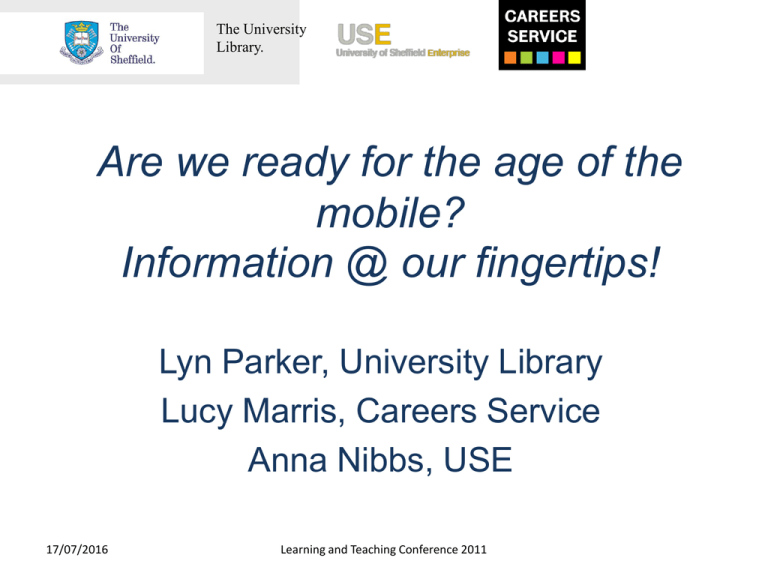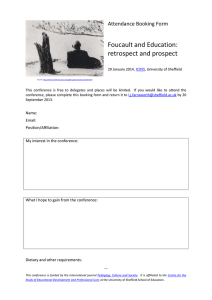Are we ready for the age of the mobile?
advertisement

The University Library. Are we ready for the age of the mobile? Information @ our fingertips! Lyn Parker, University Library Lucy Marris, Careers Service Anna Nibbs, USE 17/07/2016 Learning and Teaching Conference 2011 2010 Horizon Report • Emerging technologies should be employed to gain experience in research, problem-based learning, and creativity • Digital literacy key skill in every discipline The New Media Consortium | horizon.nmc.org Potential for mobile learning • • • • • Multiple devices, operating systems, browsers 98% mobile phone (50% smart phones) Proliferation of features available 95% laptop ownership (but not carry around) Use phone to communicate, tools eg calculator, calendar, conduct research, access VLE • BUT NUS report showed need for more Research Skills instruction Mobile apps for information The University Library. • 20-credit interdisciplinary module in enterprise and innovation • Developed and delivered by University of Sheffield Enterprise (USE) • Piloting at Levels 2 and 3 from February 2011 onwards MIH learning methods • MOLE ‘electronic workbook’ • Student-led; self-directed • Collaborative • Few face-to-face sessions – groups will potentially be working remotely • Grey literature; webbased content MIH group assessment • Partnership with Sheffield City Council - potential to solve ‘real’ problems • Work with case studies • Generate and develop an idea/innovation • Independent investigation • Synthesis of information develop a ‘pitch’ and business plan Information, enterprise and employability • MIH workbook topics – a ‘toolkit’ for skills development • Individual assessment component – reflection on skills • Whatever their destination, graduates will need to: – Collaborate and share knowledge/information (face-to-face and remotely) – Find, appraise, synthesise and present information – React quickly to high volumes of information coming from many different sources, and assess and deal with it on the move – Maintain and monitor a personal digital footprint/profile The University Library. theSheffieldGRADUATE a degree with so much more…. The 12 distinct TUOS attributes include: Information literate and IT literate The Employer Perspective …a set of abilities for employees to recognise when information is needed and to locate, evaluate, organize and use information effectively… (Cheuk, 2002, p. 2) The Student Perspective Over to you…. How important are information literacy skills from your perspective? How can students be encouraged to identify, develop and articulate this skill? The University Library. Are we ready for the age of the mobile? Collaboration is the key! Lyn Parker, l.a.parker@sheffield.ac.uk Lucy Marris, lucy.marris@sheffield.ac.uk Anna Nibbs, a.nibbs@sheffield.ac.uk 17/07/2016 Learning and Teaching Conference 2011 References • • • • • • • Bradley, C. & Holley, D. (2010) An analysis of first-year business students’ mobile phones and their use for learning. In Creanor, L., Hawkridge, D., Ng, K., Rennie, F. (Eds). “Into something rich and strange” – making sense of the sea-change, pp 89-98. ALT-C 2010. Held 7–9 September 2010, University of Nottingham. Available from: http://repository.alt.ac.uk/797 Accessed 23/12/2010. Cheuk, B. (2002) Information Literacy in the Workplace Context: Issues, Best Practices and Challenges, UNESCO White Paper. Available from: www.nclis.gov/libinter/infolitconf&meet/papers/cheuk-fullpaper.pdf Accessed 23/12/2010. CILIP (2010) Information literacy: definition. Available from: http://www.cilip.org.uk/getinvolved/advocacy/learning/information-literacy/Pages/definition.aspx Accessed 23/12/2010. Corrall, S. (2009) Information Literacy: the case for strategic management. Available from: http://hdl.handle.net/10412/183 Accessed 25/10/2010. De Saulles, M. (2007) Information literacy amongst UK SMEs: an information policy gap, Aslib Proceedings, 59, 1, 68-79. New Media Consortium (2010) The Horizon Report 2010. Available from: http://wp.nmc.org/horizon2010/ Accessed 23/12/2010. Pinchot, G. (1985) Intrapreneuring, why you don't have to leave the corporation to become an entrepreneur. New York: Harper & Row.


